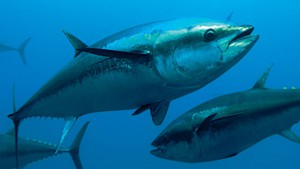
The fallout from the BP’s Deepwater Horizon oil spill continues. The oil giant is attempting to force the US government to release evidence which BP says proves that the oil spill did much less damage than at first feared.
According to the Financial Times, in filings to the US court in New Orleans, BP believes there is “extensive evidence that the environmental harm was far less than the US or others feared” and that the “environmental recovery is well under way”.
The filing was made to support BP’s case for a smaller fine under the Clean Water Act.
However, just as BP argues the impact of the spill is less than people thought, new science is still being published showing evidence of harm. The latest to be published examined the spill’s effects on the hearts of tuna fish.
The Deepwater oil spill in the Gulf of Mexico occurred just at the worst time for the tuna. It occurred at the peak spawning season of the western Atlantic population of bluefin tuna in the Gulf.
During the disaster, tuna embryos and larvae were exposed to the crude oil, causing a significant decline in the tuna population, with the latest estimate undertaken in 2012 that the population was just 36% of the baseline 1970 value.
Now scientists from Stanford University and the National Oceanic and Atmospheric Administration, (NOAA) have discovered that the crude oil interferes with fish heart cells, preventing them from beating effectively and leading to a reduced heart rate. This can lead to heart attacks and death, they argue writing in the journal Science.
Although scientists have known that components of crude oil, such as polycyclic aromatic hydrocarbons” (PAHs) are toxic to fish, especially hearts of fish embryos and larvae, they did not understand the mechanisms of how the damage was caused.
“We’ve known from NOAA research over the past two decades that crude oil is toxic to the developing hearts of fish embryos and larvae, but haven’t understood precisely why,” says co-author of the study Nat Scholz, leader of the Ecotoxicology Program at NOAA’s Northwest Fisheries Science Center in Seattle.
The researchers found that crude oil interferes with cardiac cell contraction and relaxation, which are vital processes for normal a heartbeat. The study concluded that “These results lead us to believe that PAH cardiotoxicity was potentially a common form of injury among a broad range of species during and after the [Deepwater Horizon] oil spill.”
Jacqueline Savitz, vice president for US Oceans at the conservation group Oceana, argues that the study is a “reminder that the Deepwater Horizon oil spill was the biggest environmental disaster” of our time. “Even though we can’t see many of the effects, they’re still happening,” she contends.
Nor are they the only recent research showing evidence of harm. Back in December, research published in the journal Environmental Science & Technology, examined the effects of the spill on bottle-nosed dolphins.
Nearly half of dolphins were identified as being in “guarded or worse” condition, with seventeen in such poor or grave condition they were “not expected to survive.”
Among other health problems were lung and liver damage, pneumonia and low levels of adrenal stress-response hormones. A quarter of the dolphins were also underweight. “I’ve never seen such a high prevalence of very sick animals — and with unusual conditions such as the adrenal hormone abnormalities,” said the lead author Dr. Lori Schwacke.
So that is BP’s problem. It is trying to argue that its oil had less impact than previously thought, and yet the science is telling us otherwise. And it still may be years before we know the true extent of the damage to the Gulf’s ecosystem.

Do not let BP lie their way out of this! This incedent should be a major reason to move America off of oil NOW! We must fix this or we will lose our environment and no amount of money will fix it then!
And the United States tax payers are still paying for that oil disaster. Bp paid the first 17 billion and 4 billion In compensation. That’s a penny for the largest corporation on the planet earth ( BP )
Like Exxon, BP is still lying about the ecologial and marine damage its oil spill caused. BP did NOT take enough safety measures that would have possibly prevented the massive oil spill or at least significantly shortened its duration. BP officials should be tried on the environmental crimes and coverups its committed. Their assets should be taken and their leaders should be in prison.
Poor!
Desolate!
Niger-Delta!
Patriarch of pipeline explosions,
and oil spillages.
From tale to tale
your days shorten,
and your dreams lay asleep
in the cold of shallow graves.
Though I think of you
as destiny’s child,
You neither come nor go away.
In all my grief
you are the Chief,
as one who gives
all passion away.
On the NW coast, whr the Exxon Valdez went down 22 years ago, if u walk on the beaches, kick over a rock or move a log and you STILL find puddles of oil. The calms no longer burrow down in the sand. They go down about a half and inch and then they go sideways because at one half inch depth, they run into a layer of oil. Louisiana Govt is spending dollars on advertising the safty of Gulf seafood yet they are finding oil in the larvae of crabs, oyster beds are dead and have not recovered and anyone that eats Gulf seafood is crazy.